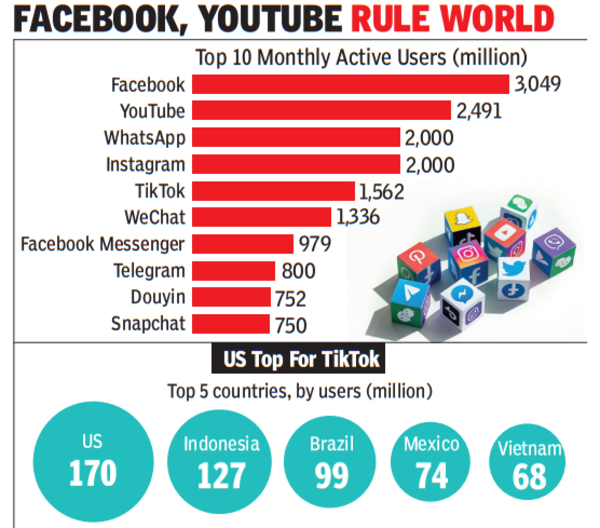[ad_1]
What is America’s problem?
There are 170 million TikTok users in America, and US lawmakers think their data is not safe with the Chinese-founded app. As BBC reported, “Chinese companies are subject to a national security law requiring them to share data with the govt on request.” This is the chief concern about Chinese companies across the West. So, the lower House of the US legislature has laid down that TikTok must find a new owner to remain available in America. The grimly titled ‘Protecting Americans from Foreign Adversary Controlled Applications Act’ threatens to effectively shut down the app.

How’s TikTok ‘adversary controlled’?
The ‘adversary control’ clause covers a scenario where “a foreign person or combination of foreign persons… directly or indirectly own at least a 20% stake”. In TikTok’s case, its Chinese parent ByteDance says on its website that it is “roughly 60% owned by global institutional investors (such as Blackrock, General Atlantic and Susquehanna International Group), 20% owned by the company’s founders, and 20% owned by its employees – including over 7,000 Americans”.
So, where’s TikTok data kept?
TikTok says ByteDance staff in China can’t access US user data. It claims US user data is stored in Singapore (CEO Shou Zi Chew is also Singaporean), and in the US itself via cloud infrastructure operated by Oracle. However, a Wall Street Journal investigation found ByteDance offices in China were able to access US users’ private data. That’s why TikTok cannot be downloaded on US govt-issued phones. There are similar bans in at least 34 US states, and 50 US universities have barred TikTok on campus Wi-Fi and their computers.
Will the Bill clear US Senate?
The bill passed with 352 votes for and 65 against in the lower House, an indication of its support among Democrat and Republican legislators. But it might not sail so smoothly through the 100-member Senate. Senate majority leader Chuck Schumer of the Democratic party has said the bill will be reviewed, and senior Democrats in the Senate have publicly opposed the bill. Also, no date has been set for a Senate vote. Meanwhile, CEO Chew is reportedly headed to Washington to speak with senators. TikTok says it is “not owned or controlled by any govt or state entity” and Chinese govt officials have denied any oversight on their part.
Didn’t Trump try to ban it?
As President in 2020, Trump signed an executive order giving ByteDance 45 days to sell the app or face a ban. However, US courts blocked the order on freedom of speech grounds and President Joe Biden eventually revoked the order in June 2021. More recently, Montana tried to ban TikTok in 2023 but was unable to clear the same freedom of speech hurdle. Ironically, Trump is a vocal supporter of TikTok now. He has said a ban would “double the business” of “Facebook and Zuckerschmuck”. Biden, however, has said he’s happy to sign the bill once the Senate clears it.
Has any country banned it?
India banned TikTok in 2020 along with scores of other Chinese apps after Chinese and Indian troops clashed at Galwan in Ladakh. Nepal banned it last year for “content that disturbs social harmony”. Across EU and most leading Western countries, it is banned on govt phones and officials’ devices.
If ByteDance sells, who’ll buy?
Selling TikTok won’t be easy. Firstly, ByteDance would need Chinese govt’s permission, and secondly, the company is valued at $250-300 billion, with TikTok its most valuable asset. It’s a huge investment for even the biggest tech firms. When Trump ordered its sale in 2020, BBC reported that “some of the biggest firms in the US emerged to explore bids” and Microsoft finally lost out on the abortive deal to a joint offer from Walmart and Oracle.
Source: Media reports, US Congress, Business Of Apps, Statista
[ad_2]
Source link

